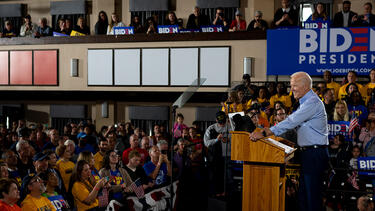Think Biden and Trump Are Too Old for the White House? Take a Look Around.
With Joe Biden, Bernie Sanders, and Elizabeth Warren among those vying to take on President Donald Trump next year, the general election may well be a contest between two septuagenarians. Yale SOM’s Jeffrey Sonnenfeld writes that those raising concerns and making jokes about the aging candidates should keep in mind research on the strengths of older people and the accomplishments of politicians and business leaders in their 60s, 70s, and 80s.

Former vice president Joe Biden campaigning in Pittsburgh on April 29. Photo: Jeff Swensen/Getty Images.
This article originally appeared in the Washington Post.
Having spent private time with both former vice president Joe Biden and President Trump, I can personally attest that they have greater physical stamina than most people half their age, but that reality is clouded by clichés.
Stand-up acts have been ageist for a long time. When Ronald Reagan, who served as president until he was 77, mentioned consulting his senior advisers in 1983, comedian Jay Leno exploded, “Senior advisers? … This guy’s 73! The whole country’s only 200! What has he got, a couple of guys from the Bull Moose Party?”
Similar sentiments are echoing this week, with a Trump/Biden volley frequently juxtaposed with the 1993 comedy Grumpy Old Men. Comedian Bill Maher cracked that Biden does have a vision for America, but “he doesn’t have night vision.” Post columnist Richard Cohen wrote that at age 76 and 77, respectively, “Biden and Sanders have waited too long…. If they don’t think so, they have gotten old without getting wise.” He added, “I wouldn’t be surprised if Biden thought Snapchat was a breakfast cereal.”
Perhaps it is Cohen who, at 78, is out of touch with the times. He should look around his own town: Senate Majority Leader Mitch McConnell is 77 and Speaker of the House Nancy Pelosi is 79, while Charles E. Grassley, president pro tempore of the Senate, is 85. Justice Ruth Bader Ginsburg is 86 and Justice Stephen G. Breyer is 80.
Yes, the Age of Aquarius is aging—with Galt McDermott, the song’s writer, having passed away last year at age 89. But 50 years after Woodstock, most of its performers are still very much around and engaged, with Joan Baez and Arlo Guthrie packing theaters in recent concert tours. Paul McCartney continues to perform into his mid-70s, filling arenas with 40-song concerts.
Research by Northwestern University economist Benjamin F. Jones demonstrates that most Nobel laureates in science since 1985 created their prizewinning work in their fourth and fifth decades. Nicolaus Copernicus offered his general theory of the universe at age 70. Frank Lloyd Wright drew sketches for Fallingwater when he was 68. And Benjamin Franklin co-authored the Declaration of Independence at 70.
At 80, the great pianist Claudio Arrau commented, “When I am playing I feel like a young man. My muscles have acquired a wisdom of their own, and I think they are working better than ever.” For eight Lincoln Center performances a week, 91-year-old Rosemary Harris earns rave reviews playing Henry Higgins’s mother in My Fair Lady—67 years after her Broadway debut.
Research has shown that older workers have greater sales skills and interpersonal savvy and show only modest declines in physical dexterity. Studies focused on the field of engineering found that older managers were only somewhat less willing to take risks and took longer to make decisions, but they were better able to appreciate the value of new information.
Forty years ago, while writing an article on the aging workforce for the Harvard Business Review, I found corporate performance studies that showed older workers possessed greater dedication and wisdom in decision-making, while younger workers were often physically stronger but with hastier judgment.
Youth is no guarantee of brilliance, and age does not ensure wisdom—nor dementia. In mythology, religion, and history, we have seen early-career dragon slayers become dragons themselves by late career.
At the same time, I’ve seen many students and clients burn out in their 30s while seeing septuagenarians champing at the bit for fresh adventure. Such disruptive entrepreneurs as Sam Walton of Walmart, Bill McGowan of MCI, Bernie Marcus of Home Depot, John Bogle of Vanguard, and Ray Kroc of McDonald’s, as well as Intel’s Andy Grove, Alibaba’s Jack Ma, and Apple’s Steve Jobs, achieved great triumphs in their fifth and sixth decades.
The legendary Maurice R. “Hank” Greenberg of C.V. Starr, who fought on the beaches of Normandy and built AIG into an insurance behemoth, turns 94 this week and tells me he still travels several times a year to China, Europe and Latin America for business—while burning out his tennis pro on Saturdays. Courageous journalist Morley Safer kept producing 60 Minutes breakthroughs until he died at age 84. Elie Wiesel died at 87, never having retired from his campaign for social justice and human rights.
The gerontologist Bernice Neugarten once told me, “It is high time we reset the clock of life, which tells us at what age it is appropriate to do what and when.” We can agree or disagree with the politics of Trump, Biden, McConnell, Pelosi, Sanders, et al., but they should be judged on their ideas, not on “acting their age.”